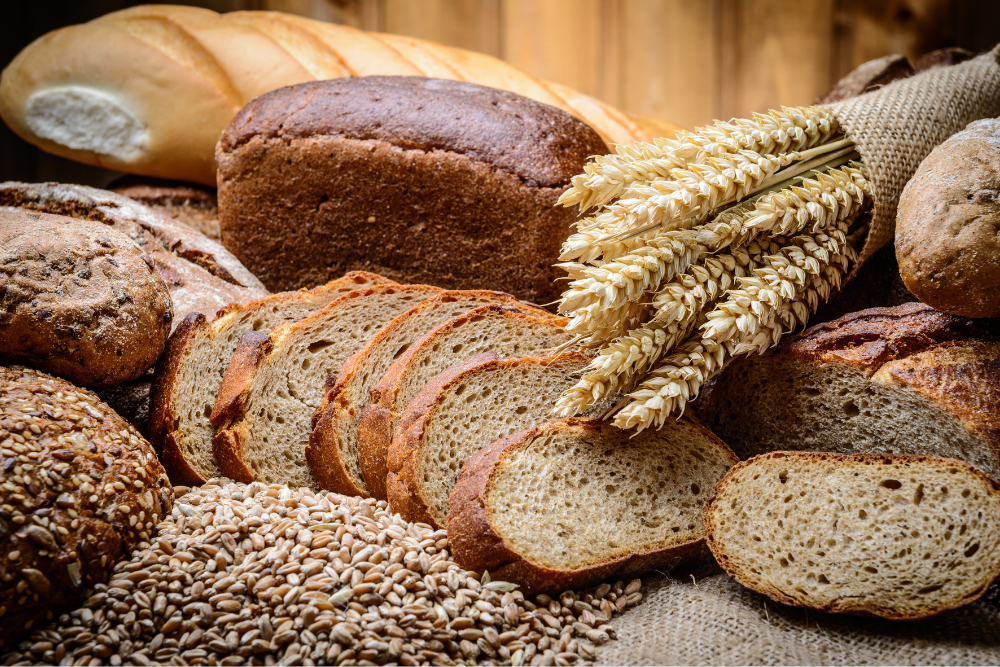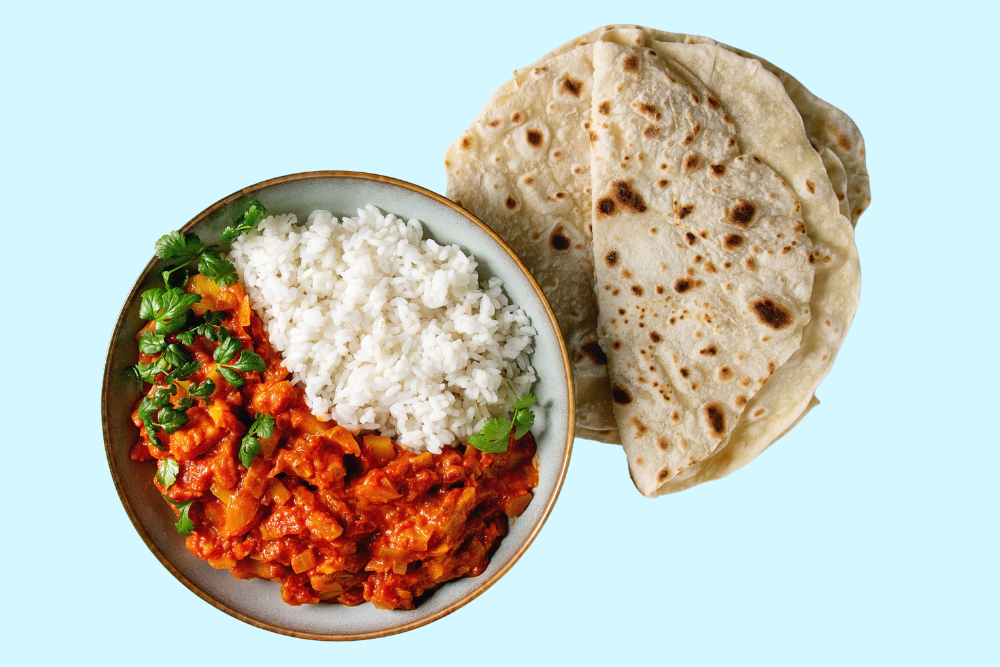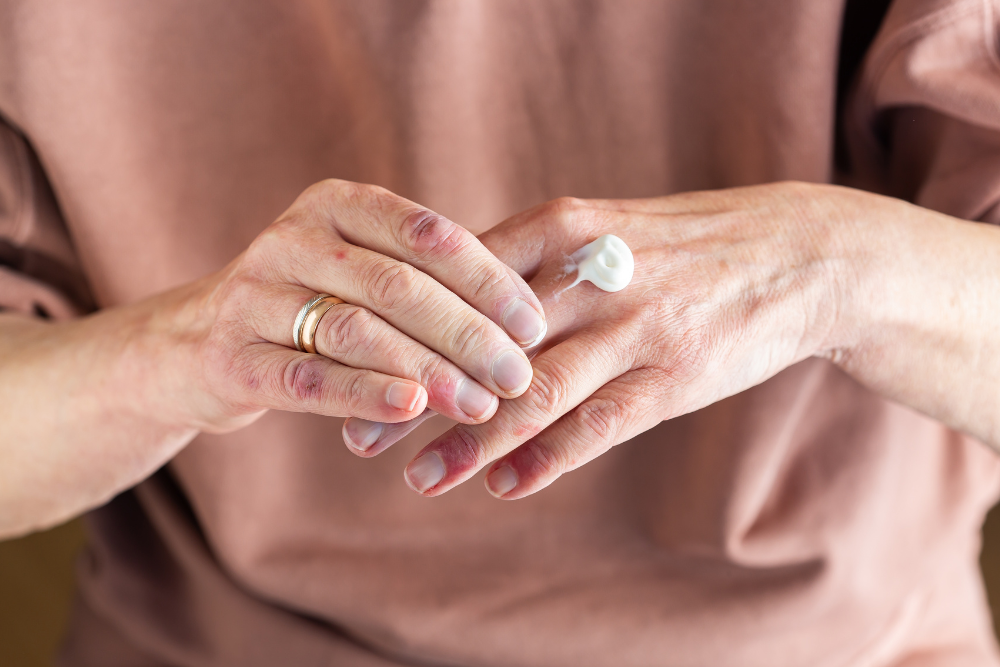To manage eczema effectively, it’s recommended to avoid potential trigger foods such as dairy products, wheat and other gluten-containing grains, sugary foods, nuts, citrus fruits, and spicy foods. These food items can exacerbate eczema symptoms due to allergies, sensitivities, or inflammatory responses in the body.
Eczema, also known as atopic dermatitis, is a chronic skin condition characterised by itchy, inflamed skin. While various factors contribute to the cause of eczema flare-ups, diet plays a pivotal role. In this comprehensive guide, we delve into the world of dietary management for eczema, focusing on certain foods known to worsen symptoms of eczema.
We explore the common food triggers that may worsen eczema, enabling informed decisions about your diet to help manage and reduce eczema flare-ups. From dairy products to certain fruits and spicy foods, we provide you with a detailed list of what to avoid and practical tips for dietary adjustments.

Eczema and Dairy Products
Navigating the relationship between what we eat and our skin health can be a complex journey, especially when it comes to dairy products and their impact on eczema. Let’s delve into this creamy conundrum to understand how dairy might play a role in eczema flare-ups.
Understanding the Dairy Dilemma
Dairy products, like milk, cheese, and yoghurt, are staples in many diets. However, for some individuals with eczema, dairy can be a trigger. The reason? It often comes down to two main components in dairy: lactose and certain proteins like casein and whey. These can sometimes provoke an allergic or inflammatory response in the body, exacerbating eczema symptoms.
The Allergic Link
Milk is one of the most common allergens, especially in children. An allergy to cow’s milk can trigger an immune response, leading to skin inflammation and worsening eczema. It’s important to differentiate between a true dairy allergy and lactose intolerance, as the latter primarily affects the digestive system and is less likely to influence eczema.
Inflammatory Responses
Even without a true allergy, dairy can still contribute to inflammation in some people. This inflammation can aggravate eczema, causing increased redness, itching, and discomfort. This response is particularly noted in individuals sensitive to the proteins found in cow’s milk.
Experimenting with Alternatives
If you suspect dairy might be affecting your eczema, consider experimenting with dairy-free alternatives. Options like almond milk, coconut yoghurt, and soy cheese can offer a similar taste and texture without the potential triggers. As always, it’s important to ensure these substitutes meet your nutritional needs, particularly in terms of calcium and vitamin D.
Personalised Approach
Eczema is a highly individual condition. What triggers a flare-up in one person might not in another. Therefore, it’s important to approach dietary changes with a personalised mindset. Keeping a food diary can help you track what you eat and eczema symptoms, providing valuable insights into potential triggers.
Seeking Professional Guidance
Consult a healthcare professional before making significant changes to your diet, particularly if dairy products are a key nutritional source. They can help you plan a balanced diet and possibly conduct allergy testing to pinpoint specific triggers.

How Wheat Affects Eczema
Have you ever considered that the humble loaf of bread on your kitchen counter could be a hidden trigger for eczema flare-ups? It’s time we shed some light on wheat, a common staple in many diets, and its potential impact on eczema.
What’s the Connection?
Eczema, an inflammatory skin condition, can often be influenced by our dietary choices. Wheat contains a protein called gluten, which, for some individuals, can provoke an inflammatory response. This isn’t just limited to those with coeliac disease. In some cases, people with eczema may have a non-coeliac gluten sensitivity that contributes to their skin flare-ups.
The Inflammation Link
Inflammation is a key player in eczema. When your body perceives gluten as a threat, it can trigger an inflammatory response, which may exacerbate eczema symptoms. This inflammation isn’t just a gut reaction; it can manifest in the skin, leading to redness, itching, and discomfort.
Identifying Sensitivity
How do you know if wheat affects your eczema? The best approach is an elimination diet. This involves removing wheat and other gluten foods from your diet for a period and reintroducing them to observe any changes in your eczema symptoms. It’s essential to do this under the guidance of a healthcare professional to ensure nutritional balance and proper interpretation of results.
Alternatives to Consider
If you find that wheat is a particular food that worsens your eczema, don’t worry; there are plenty of delicious and nutritious alternatives. If you choose to adopt a gluten-free diet, foods like quinoa, rice, oats (make sure they’re labelled gluten-free), and almond flour can be great substitutes in your meals and baking adventures.
A Personal Journey
Remember, the relationship between diet and eczema varies from person to person. While wheat might be a trigger for some, it may not affect others. It’s all about understanding and listening to your body. Keeping a food diary and eliminating foods can be invaluable tools in this discovery process.

The Impact of Sugar on Eczema
In the quest to manage eczema, the role of diet is often scrutinised, and sugar is a topic of particular interest. Let’s unwrap the sweet (and not-so-sweet) truths about sugar’s impact on eczema.
Sugar and Inflammation: The Bitter Connection
At the heart of eczema is inflammation. Consuming high amounts of sugar, especially refined sugars found in processed foods, can trigger the body’s inflammatory response. This is because sugar can prompt a surge in insulin levels, leading to an inflammatory cascade that can worsen eczema symptoms such as redness, itching, and swelling.
The Glycemic Index Factor
Foods high on the glycemic index (GI) – which means they cause a rapid spike in blood sugar levels – can be particularly problematic for eczema sufferers. These include items like white bread, cakes, and sugary drinks. Opting for low-GI foods, which release sugar more slowly into the bloodstream, may help manage eczema flare-ups.
The Sweet Itch: Sugar and Skin Irritation
Beyond inflammation, sugar can also affect the skin’s natural balance. It can interfere with the body’s ability to regulate itself, leading to more pronounced eczema symptoms. Additionally, high sugar intake can sometimes exacerbate itching, making it more difficult to resist scratching and potentially leading to further skin damage.
Cutting Down on Sugar: A Personal Experiment
If you’re curious about sugar’s role in your eczema, consider reducing your sugar intake as a step towards an anti-inflammatory diet. This doesn’t mean you have to cut out all sweetness from your life – natural sugars found in fruits, for example, come with beneficial nutrients and fibre. The key is moderation and opting for healthier, more natural sources of sweetness.
Alternative Sweeteners: A Cautionary Note
While it might be tempting to switch to artificial sweeteners, be cautious. Some of these can also trigger inflammation or allergic reactions in sensitive individuals. It’s best to use them sparingly and monitor how your body and skin react.
Consulting a Professional
Before making significant dietary changes, especially if you have a sweet tooth, it’s wise to consult with a healthcare professional or a nutritionist. They can provide personalised advice, ensuring that any changes to your diet are safe and nutritionally balanced.

Navigating Eczema and Nuts
When it comes to managing eczema, the foods we eat can have a significant impact, and nuts are a topic worth cracking into. Let’s explore how nuts might turn mild eczema into severe atopic dermatitis and how to navigate this in your diet.
Nuts: A Double-Edged Sword
Nuts are a nutritious powerhouse, packed with healthy fats, proteins, and vitamins. However, for some individuals with eczema, nuts can be a trigger. This is often due to allergic reactions, as nuts are among the most common food allergens. An allergic reaction to nuts can exacerbate eczema symptoms, leading to increased inflammation, itching, and discomfort.
Identifying Allergies
If you suspect that nuts might affect your eczema, getting tested for allergies is important. A healthcare provider can conduct tests to determine if you’re allergic to specific nuts. It’s important to distinguish between a true nut allergy and a sensitivity, as the former can be life-threatening.
Inflammation and Eczema
Nuts can be beneficial for those who are not allergic due to their anti-inflammatory properties. Foods rich in omega-3 fatty acids, like walnuts and almonds, can help reduce inflammation and thus aid in managing eczema symptoms.
Trial and Error
Everyone’s body reacts differently. If you’re not allergic to nuts, you might consider including them in your diet and observing any changes in your eczema. Start with small quantities and note any reactions. A food diary can be a helpful tool in tracking these observations.
Safe Consumption
If you’re introducing nuts into your diet, do so cautiously. Opt for raw or dry-roasted nuts without added sugars or salts. Be wary of processed foods containing nuts, as they often come with other additives that could trigger eczema.
Alternatives to Consider
If nuts are a trigger for you, there are many alternative sources of the nutrients found in nuts. Seeds like chia, flaxseed, and hemp seeds are excellent alternatives, offering similar nutritional benefits without the risk of triggering eczema flare-ups.
Seek Professional Advice
As with any dietary changes, especially when dealing with food allergies and a condition like eczema, it’s important to seek advice from a healthcare professional. They can provide guidance tailored to your specific health needs and conditions.

Eczema and Citrus Fruits
When managing eczema, it’s essential to consider various dietary factors, and citrus fruits often come under scrutiny. Bright and tangy, these fruits are a favourite for many, but for those with eczema, they may present some challenges. Let’s delve into how citrus fruits might affect eczema.
Citrus Fruits: A Burst of Potential Irritants
Citrus fruits, like oranges, lemons, limes, and grapefruits, are rich in vitamin C and other nutrients. However, they also contain natural chemicals and acids that can be potential irritants for those with sensitive skin or eczema. The acidity and certain compounds found in citrus can sometimes trigger eczema flare-ups, leading to increased itching, redness, and irritation.
Allergic Reactions and Sensitivities
While not as common as other food allergies, some individuals may have an allergy or sensitivity to citrus fruits, which can exacerbate eczema symptoms. This reaction is usually due to the proteins in these fruits, which can cause an immune response in sensitive individuals.
The Role of Histamines
Citrus fruits are high in histamines, natural chemicals that can trigger allergic reactions and increase inflammation. For those with eczema, this histamine load can potentially worsen symptoms, especially in individuals more sensitive to histamine-rich foods.
Personalised Dietary Approach
As with many aspects of eczema management, the impact of citrus fruits varies from person to person. Some may find that these fruits trigger their symptoms, while others may not experience any negative effects. The best way to determine your body’s response is through a controlled elimination diet, where you remove citrus fruits for a period and then gradually reintroduce them to observe any changes in your eczema.
Balancing Nutritional Needs
If you find that citrus fruits aggravate your eczema, it’s important to seek alternative sources of vitamin C and other nutrients that these fruits provide. Foods like kiwi, strawberries, bell peppers, and leafy greens are excellent options.
Consulting a Healthcare Professional
Before making significant changes to your diet, especially if you suspect a food sensitivity or food allergy, consulting with a healthcare professional is advisable. They can guide you in maintaining a balanced diet while managing your eczema effectively.

The Spicy Food-Eczema Connection
Diving into the world of spicy foods can be a thrilling culinary adventure, but for individuals with eczema, it’s a journey that might have some unexpected turns. Let’s explore how spicy foods can influence eczema symptoms.
Heat and Inflammation: A Fiery Duo
Spicy foods, known for their heat and bold flavours, often contain capsaicin (found in chilli peppers) or other compounds that can stimulate a heat response in the body. This stimulation can lead to increased blood flow and, potentially, an exacerbation of the inflammatory processes associated with eczema. The result? A flare-up of symptoms like redness, itching, and irritation.
Sweat and Irritation
Eating spicy foods typically induces sweating, a natural body response to regulate temperature. However, sweat can be an irritant for eczema sufferers, worsening skin symptoms. The combination of sweat and the heat from spicy foods can create an uncomfortable cycle of itching and scratching.
Digestive Stress and Skin Health
The link between gut health and skin conditions like eczema is increasingly recognised. Spicy foods can sometimes cause digestive stress or discomfort, particularly in those with sensitive stomachs. This digestive imbalance can have a knock-on effect on skin health, potentially triggering eczema flare-ups.
Personal Tolerance Levels
It’s important to note that the reaction to spicy foods can vary greatly among individuals with eczema. While some may experience noticeable flare-ups, others might tolerate spicy foods without any adverse effects. Understanding your personal tolerance level is key.
Experimenting With Moderation
If you’re unsure how spicy foods affect your eczema, consider experimenting with moderation. Introduce mild spices initially and observe how your skin reacts over the following days. Keeping a food diary during this period can be a helpful way to track any changes in your symptoms.
Seeking Alternatives
For those who find that spicy foods aggravate their eczema, there are many flavorful alternatives. Herbs and spices like turmeric, ginger, and cinnamon can add depth and flavour to dishes without the heat that might trigger eczema symptoms like itchy skin.
Consultation with a Professional
Before making significant dietary changes, especially if spicy foods are a regular part of your diet, consulting a healthcare professional or a dietitian is advisable. They can provide tailored advice and help you navigate dietary choices to manage your eczema effectively.

Treat Eczema Effectively
Whether you have eczema on your hands or face, treating eczema typically involves a multi-faceted approach focused on reducing symptoms and preventing flare-ups. Aside from eliminating trigger foods from your diet, key strategies include regular application of moisturisers to maintain skin hydration, avoiding known irritants such as harsh soaps and certain fabrics, and managing stress.
For some individuals, medications like topical corticosteroids or antihistamines may be prescribed to reduce inflammation and itching. Additionally, identifying and avoiding dietary triggers can also play a role in effectively managing eczema. It’s important to work closely with a healthcare provider to develop a personalised treatment plan.




